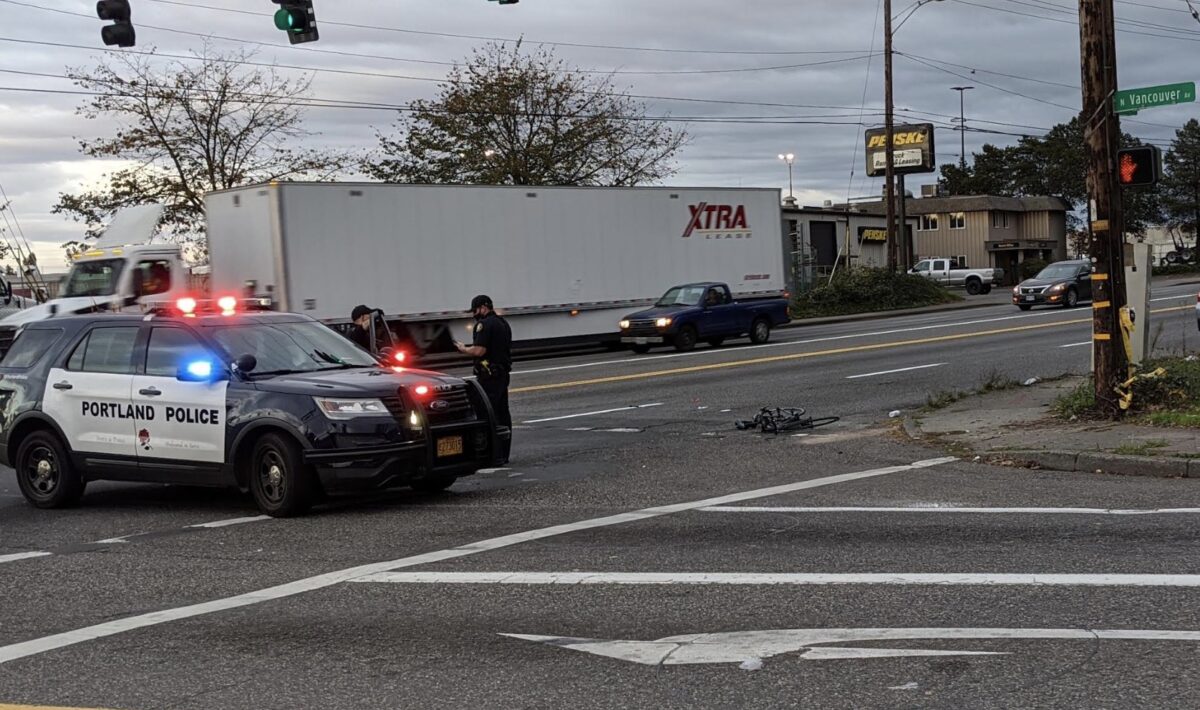
(Photo: Jason P.)
Monday night around 6:00 pm BikePortland reader Jason P. rolled up on the aftermath of a hit-and-run at North Vancouver and Columbia. A bicycle rider was taken away in serious condition after what a witness described as a right-hook while using bike lanes that have already been identified for safety improvements by the City of Portland.
Many of you are familiar with this intersection because it’s just south (about 900 feet) of the entrance to the popular Columbia Slough bike path and is also a way to get to Marine Drive.
According to Jason, the victim was bicycling north on Vancouver and the collision occurred at the southeast corner of the intersection. It was a classic right-hook situation. “I bike this route a lot, and it’s definitely a dangerous location for right hooks because the lane is tight, there’s often debris, the road is sketch, and bikes will have a lot of downhill speed,” Jason shared in an email.
Jason spoke to a driver who saw the collision who said the bicycle rider was, “In bad shape; unconscious, but breathing.” The driver also said the alleged suspect was driving an SUV and confirmed they right-hooked the victim before driving off. Thankfully, the witness got the license plate number and the information has been given to the Portland Police Bureau officers who responded.
Advertisement
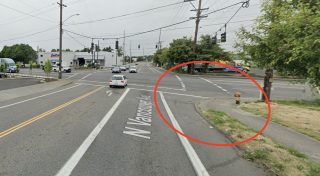
This section of Columbia is a well-known problem spot. Speeds on Columbia Blvd are very high and it’s managed more like a freeway than a street people outside of cars also need to use. It’s also a major freight route. Thankfully, the Portland Bureau of Transportation is working to make it safer through their Columbia Lombard Mobility Corridor Plan that’s set to be released in draft form later this year and possibly adopted by city council in early 2021.
A draft project list released in November 2019 includes one project that would directly impact this intersection. Project #47 would, “Improve safety and comfort of existing bike lanes on N Vancouver Ave between Stafford Ave (south of Lombard) and provide an enhanced crossing of Vancouver at the Columbia Slough Trail.”
For the victim of last night’s crash, this project is too late.
The bike lanes on Vancouver provide a critical link between the Rose Quarter and the Columbia River. Given the proximity of this intersection to a popular east-west bike path (that will be even more popular as new links are built in the coming years), PBOT must address these basic safety hazards as soon as possible.
This post will be updated if we hear any updates on the case or the victim’s condition. If you have more information about what happened, please call PPB non-emergency at 503-823-3333. UPDATE, 10/23: The daughter-in-law of the victim has posted on Twitter that the victim is still hospitalized with a bad concussion but suffered no broken bones or other major injuries. Police have also apprehended the alleged suspect driver.
In related news, there was another hit-and-run involving a bicycle rider early before sunrise this morning near NE Prescott and 115th. KATU TV reporter Mike Warner captured images from the scene and he says the victim had minor injuries.
HIT-N-RUN: @PortlandPolice are investigating a crash near NE 115th & Prescott. I watched them transport bicycle rider, who appeared to be towing a trailer. Officer tells me car left scene, no description. Victim has minor injuries. Stay with #LiveOnK2 #pdxtraffic pic.twitter.com/pNxMfmjH5B
— Mike Warner (@MikeKATU) October 20, 2020
— Jonathan Maus: (503) 706-8804, @jonathan_maus on Twitter and jonathan@bikeportland.org
— Get our headlines delivered to your inbox.
— Support this independent community media outlet with a one-time contribution or monthly subscription.



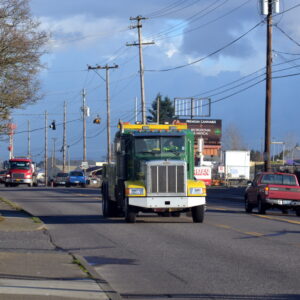
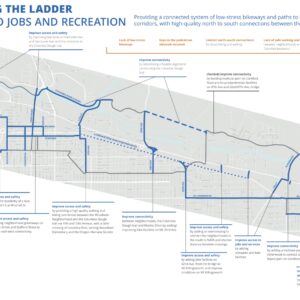

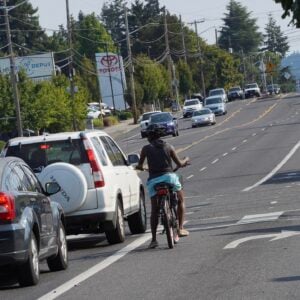
Thanks for reading.
BikePortland has served this community with independent community journalism since 2005. We rely on subscriptions from readers like you to survive. Your financial support is vital in keeping this valuable resource alive and well.
Please subscribe today to strengthen and expand our work.
Vancouver@Columbia: Could PBOT put in temporary orange traffic cones at the end of the bike lane just before the crosswalk, to discourage cars from crossing over into the bike lane?
Might as well screw in a few delineator wands. Would take just a few minutes more. And yes, I think they should absolutely do this ASAP.
Delineator wands would be knocked down within a day. Maybe a few lengths of jersey barrier.
sorry. Sometimes my head goes to what is feasible politically based on past PBOT behaviors instead of what we really need to do. Yes concrete barriers would be better… But that’s not what they typically do. I could see them however, responding quickly with posts/plastic curbs, because that’s already in their design guidelines and they’ve already done it in numerous locations.
No one’s going to pay attention to orange traffic cones in that area. *Possibly* if you added caution tape.
Thanks to the quick thinking witnesses!
Jonathan: please consider – in the future – not using the word “impact” in the way that you did. [“A draft project list released in November 2019 includes one project that would directly impact this intersection.”]
It reads as an editorial comment – that the proposed ‘safety changes’ would be a negative..like reduced MV capacity etc. Better would have been “includes one project at this intersection… and makes changes to ‘X’…” if you know what the SOW proposed is.]
This is exactly the type of situation ORS 814.430(2)(c) refers to, allowing you to leave the bike lane and take the travel lane due to unsafe conditions.
A so-called ‘protected lane’ will not help in this situation if it remains to the right of right-turning vehicles, as the same conflict point will still exist.
Sure, but right hooks are much less likely to occur with protection because drivers have a strong visual reminder that bikes may appear to their right. When it’s just a painted line it’s easy for drivers to forget to check their blind spot. Green conflict markings through the intersection would also be helpful.
Unless that protected lane is hidden from view behind a row of parked cars.
Common misconception with PBLs as they are intended to be built with a protected intersection. You are likely referring to a PBL without a protected intersection, in which case they are more dangerous.
Even where there is a protected intersection, driveways are usually not similarly protected. I do like having some sort of barrier (even wands are pretty good), but visibility is critical.
Very true about driveways. But the likelihood of a collision is much less due to frequency (people don’t use their driveway as often as a street), driver attentiveness when coming out of the house, and visibility (instead of a looking over their shoulder to avoid a right hook, a driver is looking directly at an oncoming person on a bike).
Generally more people turn at intersections than at driveways (though some situations may differ), but it’s still an unnecessary risk. The payoff of being protected from being struck from behind is much smaller than the risk of being right-hooked by a driver who can’t see me.
This is one of those increases in imagined safety in exchange for increases in real but less apparent risk.
Sorry I don’t follow. See the protected intersection vid above.
I just meant that I agree that intersections are often a bigger problem than driveways (higher volumes), and that the risk of being struck from behind in a non-protected bike lane (small to begin with) decreases as risk of being right-hooked at a driveway (larger risk) increases. I think the benefits of PBLs are psychological, while the costs are physical.
…Unless the driveway is to a massive parking lot or parking garage. A driver turning right into a driveway poses all the same risks to bicyclists in a right-side bike lane as the same driver turning right at an intersection, unless that intersection is “protected”. How many protected intersections does Portland have now?
I’m not certain what a protected intersection is, but I’m certain that none of the PBLs I’ve used in PDX have them.
Yes, unfortunately you are correct. People often argue against them in Portland likely because they are unfamiliar with them. They don’t really exist here. Portland still has some of the worst infrastructure in N. America.
To be fair, the intersection is the worst / most dangerous part of (PDX version) PBLs. I’m guessing that proper protection would be an island of concrete?
I still say, if people want to drive cars like bumper cars, fine. Energize them with overhead cabling and *crucially* cut the power at intersections when they don’t have the right of way. Oh… inertia, we can talk about that later.
There’s something that resembles a protected intersection up at NW 20th Ave / Thurman? But it’s kind of wasted in a place where people go mostly to park their cars.
This is untrue at the corner of Jefferson and 12th downtown. Back when we went to work and stuff, Jefferson was the start of my route home. I only rode it a couple of days a week for maybe a year or so, and had at least 3 “near-right-hooks” in which my own evasive action prevented me being hit by drivers. That’s at least 3% of crossings at an intersection of a “protected” bike lane and a one-way street that resulted in near-collisions. Maybe only having one’s life threatened 3% of the time ain’t too bad?
Your solution is typical from a vehicular cycling ideology.
Here is what is standard design in most places where cycling is the norm. Protected intersection.
https://vimeo.com/86721046
The pejorative use of the phrase “vehicular cycling ideology” is like some sort of in-group shibboleth that doesn’t comport meaning to the general reader. Bikes are vehicles.
Yep, it’s a shibboleth. Here’s a pretty good explainer: http://shifter.info/vehicular-cycling-is-dead-just-dont-bury-the-body-yet/
+1 for the Yiddish!
I love it.
Thanks for the link. Some of those comments are really problematic.
Yeah no prob. I think it’s difficult to conceptualize for a lot of people in Portland when you’ve never really experienced safe infrastructure. It can be frustrating when all you know is the infinite variations on weird creations PBOT is forced to make because politicians often require them to retain car parking, capacity and speed as a prerequisite to any design.
Portland, the land of infinite traffic unicorns. Each more special and disturbing than the last.
That is a wondrous and evocative turn of phrase. I like it.
List your favorite traffic unicorns!
I vote the 1-block cycletrack at 30th and Stark. Instead of building a protected bike lane on 28th that would have increased business profit and made a safe and direct connection between SE and NE, we have a complex, virtually unusable zigzag of Chex Mix. Car capacity at its best.
One that actually works well is the bike redirect at SW Barbur and SW Nato. It works well because it positions the cyclist at right angles to cars, but protects the bikes behind a concrete island. There’s also flashers if you need to be assertive.
My least favorite (to hate on) is the big illuminated sign at NE Couch and NE Grand Ave. This is just an expensive “no turn” sign, that motorists ignore anyway.
The traffic unicorn we need is one that goes and cleans bike lanes, on PBOT payroll.
You’re thinking of the bike lane goats. The advantage of the unicorns, though, is that unlike goats, they magically disappear as you approach, and so don’t block the lane. Goats just stand there in the middle of the lane, chewing and staring at you…
To revisit the unicorn subject, I really – really don’t like the green swath of paint for the west bound lane of Ankeny at SW Sandy. It’s a death trap. I’ve used it before but motorists cut that corner like it’s The Italian Job, I’ll wait to see how the tire tracks wear that paint down.
I agree that right hooks might still happen, but I do think that with a protected lane they are less likely to happen as frequently. Drivers would have a visual cue that cyclists are there, *and a physical barrier* in case they don’t seeCyclists would have a real buffer to protect them from drivers.
When everybody is traveling straight, for example midlock away from driveways, cyclists don’t need a ton of protection from drivers. Conflicts where cyclists are going straight while vehicles are turning across their path are much more frequent and dangerous.
Your intuition is supported by research. Intersections are where most conflict occurs. But what type of intersections are safest?
https://reader.elsevier.com/reader/sd/pii/S1369847816300705?token=F920692505937506521822D4AEA502FCED31BE54AEB940B8D0FE902A3ECFCE64321622D6B1499CCD2B11B787804E880A
Project 47 states, “Improve safety and comfort of existing bike lanes on N Vancouver Ave. Provide an enhanced crossing of Vancouver at the Columbia Slough Trail.” Unfortunately, it is very possible PBOT will decide based on car capacity and speed, that creating a protected bike lane with protected intersections on Vancouver is not possible. The inevitable result is an inherently dangerous design.
Assuming this project is not already completed, there are no other projects that would address this intersection.
This is another sad story, but also further illustrates the failure of Chloe Eudaly.
It’s a failure of the driver. There is no way to not see a cyclist as one approaches that corner.
If there were no bike lane would it still be the failure of a driver? How about if there were no sidewalks or crossings? Would a person driving be more or less likely to hit a person walking?
What if the driver was blind?
There is a bike lane and a clear line of sight. It is a failure of the driver.
The idea behind changing the road infrastructure is this: when not if, when, a person in a car makes a mistake, it does not result in a fatal crash. When cars and people walking and on bikes are separated by a physical barrier, a mistake results in fewer or no fatalities/injuries. That is the difference. Driving mistakes are inevitable, fatalities are not.
Nothing is truly Foolproof, because Fools can be very ingenious.
In terms of root cause analysis, it’s the driver’s parents fault for listening to Barry White and getting horny.
The point is, preventative measures plan for the largest effective change possible and accept corner cases as what they are, unique.
Taken to a logical extreme, preventative measures don’t work. Because they do not work 100% effectively. That doesn’t indicate an opportunity to abandon safety measures.
Uh… that would make it Barry White’s fault.
RIP. LOL. I like that new definition of Soul Seduction.
The sun. It was the sun.
Have you seen the new Lincoln Navigator?
 ?resize=640%2C359&ssl=1
?resize=640%2C359&ssl=1
Many of the new SUVs on the road have front corner blind spots big enough to swallow a cyclist.
Exactly why the ETSC promoted banning SUVs.
AND that’s in Europe where SUVs actually have some pedestrian safety built into the lowered hood edge, grille, etc. NOT the case in USA, with our pickups with 6′ high grilles. Ugh… maybe someday our vehicles will be reasonably sized.
That particular intersection is at the bottom of slight downhill. If anything, being in an SUV that large would provide an even better view.
“It’s over Anakin – I have the high ground.”
Cycling past stopped cars on the right is something I frequently do in bikes lanes. Proceed with caution!
“Many of you are familiar with this intersection because it’s just south (about 900 feet) of the entrance to the popular Columbia Slough bike path and is also a way to get to Marine Drive.”
It is also a primary route to Vancouver, Washington and Hayden Island. I bicycle through this intersection regularly to shop at Lowes, Home Depot and a few other big box-type destinations.
To its credit, PBOT has recently added a painted buffer to the bike lanes north of Columbia Blvd.
I hope the person injured makes a quick and full recovery.
Ted Buehler
At least the car had a license plate. Most of the troublemakers on my block are driving around with temporary permits, if that.
Is the Oregon DMV ever going to get moving again? It’s hard to ID a car without plates, especially now that “gray crossover” describes nearly half of them
Thank goodness someone recorded the plate number. Im not going to hold my breath while I wait to see if ppb follows up and apprehends the suspect. Nor do I have any hope that the suspect, if apprehended and charged, will actually do time commensurate to the gravity of the crime. But at least there’s a chance that one dangerous driver might be temporarily taken off the road.
No update from PPB?